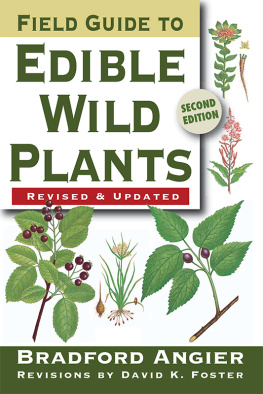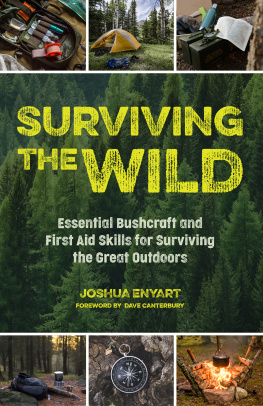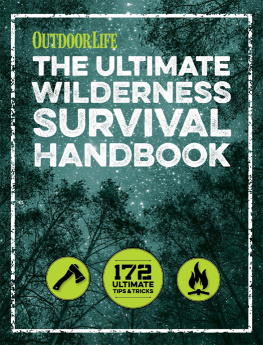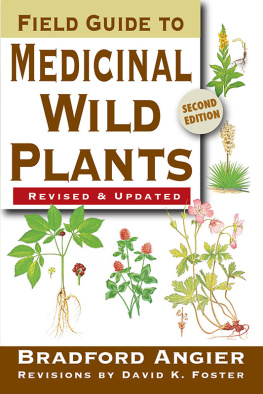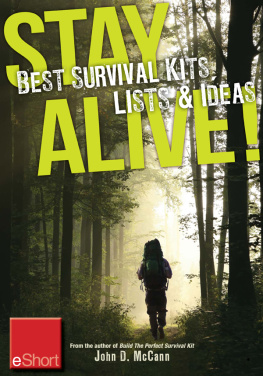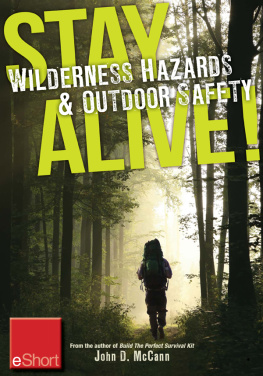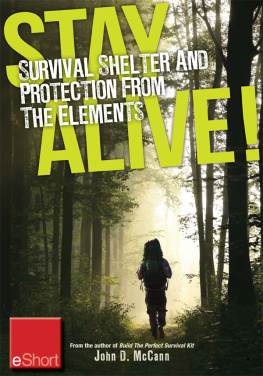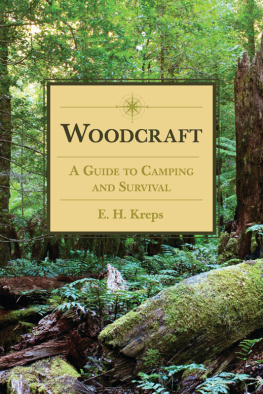HOW TO STAY ALIVE IN THE WOODS
BRADFORD ANGIER
Originally published asLIVING OFF THE COUNTRY
Illustrated by Jack Doherty

Copyright 1956 by Bradford Angier
Copyright renewed 1984 by Bradford Angier
All rights reserved, including the right of reproduction in whole or in part in any form.
Published by arrangement with the Stackpole Company
First Black Dog & Leventhal Edition 2001 2001 by Black Dog & Leventhal
Original Artwork 2001 by Jack Doherty.
Color illustrations copyright 1974 By Arthur J. Anderson.
Used by permission of Stackpole Books.
Additional text by Ben Ikenson
All rights reserved. No part of this book may be reproduced in any form or by any electronic or mechanical means including information storage and retrieval systems.
Published by
Black Dog & Leventhal Publishers, Inc.
151 West 19th Street
New York, NY 10011
Distributed by
Workman Publishing Company
225 Varick Street
New York, NY 10014
ISBN: 978-1-57912-221-8
eISBN: 978-1-60376-286-1
Library of Congress CIP data is on file at the offices of Black Dog & Leventhal.
To my friend
COLONEL TOWNSEND WHELEN
who early began making some marginal notes on the book of nature, some of whose most valuable chapters he is still writing.
CONTENTS
PART ONE
SUSTENANCE
PART TWO
WARMTH
PART THREE
ORIENTATION
PART FOUR
SAFETY

PART ONE
SUSTENANCE
A party living off the country must know how to get full value from everything available, especially in the way of food.
Royal Canadian Mounted Police
Chapter 1
Every Necessity Is Free
ANYONE AT ANYTIME CAN SUDDENLY FIND HIMSELF dependent on his own resources for survival. It costs very little time, money, and effort to be ready for such an emergency. If you are not ready, it may cost your life.
You may become lost or stranded in the woods. Thousands of North Americas millions of annually-licensed fishermen and hunters do each year, many fatally. Yet, almost invariably, where such individuals suffer and all too often succumb to starvation or exposure, wild food is free for the picking, meat is free for the taking, fire may be made, and clothes and shelter are there for the building.
You may be in an automobile that is stalled by mishap or storm in an unsettled area, a not uncommon occurrence that frequently results in unnecessary hardship and tragedy. Perhaps youll be a passenger in an aircraft that has to make a forced landing. Perhaps youll be shipwrecked.
It may even happen that you and yours will one day be compelled to seek sanctuary in the wilderness because of threats to civilization itselfan atom bomb catastrophe or the even more terrible microscopic foes of germ warfare.
Mans capacities have never been measured; nor are we to judge what we can do by any precedents, so little has been tried, pointed out Thoreau. What people say you can not do, you try and find you can.
No hard and fast rules can be laid down for survival anywhere, particularly in the farther places. Conditions vary. So do localities, and especially individuals. Initiative on the other hand may be guided by a consideration of general principles such as those presented in this book.
Many of the pitfalls, too, may be recognized and avoided that otherwise might have to be learned by unnecessarily hard and often dangerous personal experience. It will be far more satisfactory to deal with natural difficulties by adaptation and avoidance than by attempting to overcome them by force.
Using the ways of living off the country discussed herein as a foundation for ingenuity and common sense, will allow anybody who suddenly finds himself dependent upon his own resources to keep living and to walk away from any hardships smiling.
The wilderness is too big to fight. Yet for those of us wholl take advantage of what it freely offers, nature will furnish every necessity. These necessaries are food, warmth, shelter, and clothing.
Chapter 2
Living Off the Country
ONE DAY YOU MAY BE BOATING DOWN THE PEACE River near the start of its more than 2000 mile journey inland to Great Slave Lake and thence as the Mackenzie to the Arctic Ocean. Soon after the headwaters of this wilderness highway mingle in the Continental Trough, the river turns abruptly eastward to flow with surprising tranquility through the entire range of the Rocky Mountains. If you watch the left shore after chuting through the minor turbulence known as Finlay Rapids, your eyes will likely as not catch the platinum gleam of Lost Cabin Creek.
Here it was at the turn of the century, during those apical days on the worlds gold-fever chart, that four prospectors shared the cabin from which the stream has taken its name. Their grubstake dwindling, three watched with growing helplessness their fourth companion die, by which time the survivors themselves had become so feeble they lacked the vigor to open the frozen ground outside.
They buried their companion in the only spot they could find earth still loose enough to dig. A second prospector died and had also to be there interred. Before the fourth succumbed, he had by himself managed to scoop out enough earth so that a third emaciated body could be added to the grave beneath the cabin floor.
Yet as you will be able to testify from what you can see while boating past Lost Cabin Creek, and as I can substantiate from having camped there on several occasions, the vicinity abounds year around with wild edibles.
Sustenance in the Silent Places
Starvation is not a great deal more pleasant than most of us would expect. The body becomes auto-cannibalistic after a few foodless hours. The carbohydrates in the system are devoured first. The fats follow.
This might not be too disagreeable, inasmuch as diets seek to accomplish much the same result, but then proteins from muscles and tendons are consumed to maintain the dwindling strength their loss more gravely weakens.
No reasonable nourishment should therefore be scorned if one needs food. The Pilgrims derived considerable nutriment during their first desperate Massachusetts winter from ground nuts which are similar to small potatoes. Some northern explorers including Richardson, Franklin, and members of their parties lived for weeks and sometimes months almost entirely on the lichen known as rock tripe.
Wild turnips kept up John Colters strength when the mountain man made his notable escape from the Indians. Beaver meat was a main item on the menu while Samuel Black explored the Finlay River. When regular rations on the Lewis and Clark expedition had to be reduced to one biscuit a day, it was the sweet yellow fruit of the papaw tree that kept the men going.
There is no need to explain why, if any of us are ever stranded and hungry in the wilderness, we will want to start searching for food while our strength is still near its maximum.
Food Prejudices
Few will disagree, at least not when the moment of decision is at hand, that there is a point where luxuries as such become relatively unimportant.
One of lifes luxuries, which we esteem most highly, is the freedom to indulge our taste buds. Our taste prejudices, a better understanding of which may one day prove beneficial, are commonly based on two factors.


